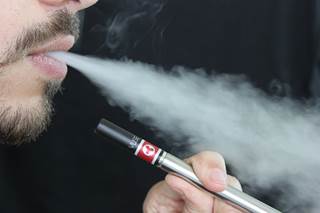Vaping Linked to a Noisy, Foreboding Consequence of Poor Lung Health
 Electronic cigarettes are marketed as less harmful alternatives to cigarette smoking, but researchers are increasingly concerned about the potential long-term health consequences of vaping. A study released recently in the journal Tobacco Control adds to the growing number of reasons the phenomenon is riskier than it might appear.
Electronic cigarettes are marketed as less harmful alternatives to cigarette smoking, but researchers are increasingly concerned about the potential long-term health consequences of vaping. A study released recently in the journal Tobacco Control adds to the growing number of reasons the phenomenon is riskier than it might appear.
According to scientists from the University of Rochester and the Roswell Park Comprehensive Cancer Center, people who vape are nearly twice as likely to experience wheezing compared to people who don’t regularly use tobacco products. Wheezing -- which is typically caused by inflammation and narrowing of the airway between the throat and lungs -- is often seen as a precursor to serious health conditions, including lung cancer and heart failure.
“The take-home message is that electronic cigarettes are not safe when it comes to lung health,” study author Deborah Ossip, Ph.D., said in a statement. “The changes we’re seeing with vaping, both in laboratory experiments and studies of people who vape, are consistent with early signs of lung damage, which is very worrisome.”
The study identifies the correlation of vaping and wheezing. A previous study in a 2017 paper in PLOS One found a link between e-cigarette use and greater odds of wheezing and shortness of breath.
When comparing non-users to those who exclusively vape, researchers found that the risk of wheezing and related respiratory symptoms significantly increased. For example, adult vapers were 1.7 times more likely to experience difficulty breathing, but vapers had lower odds of wheezing compared to those who only smoked cigarettes and those who used both tobacco products.
“Promoting complete cessation of both smoking and vaping will be beneficial to maximize the risk reduction of wheezing and other related respiratory symptoms,” the study’s authors said. “Importantly, we reported that ex-smokers who did not vape … still have significantly elevated risk of wheezing and other related respiratory symptoms, compared with never smokers, suggesting long-term impact of prior smoking.”
The Centers for Disease Control and Prevention reported that, in 2018, vaping increased by 78 percent among ninth- to twelfth-graders and 48 percent in sixth- to eighth-graders. In 2017, more than two million middle and high school students were regular users of e-cigarettes.
Researchers conducting the study said they are concerned that the study indicates that if young people continue to vape, they will develop serious health consequences.

